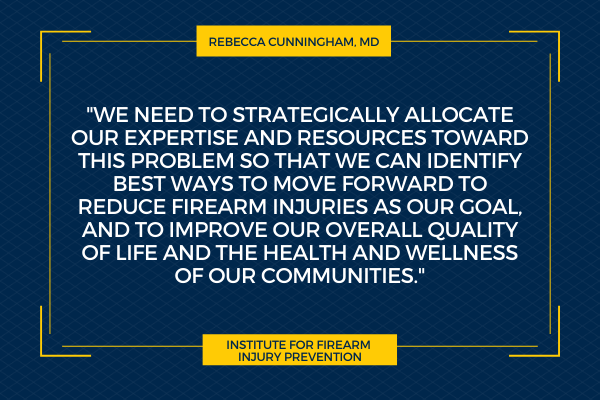Michigan Minds – Firearm Injury Prevention Series: Diverse Perspectives, Common Goals with Rebecca Cunningham
June 7, 2021
ANN ARBOR – This episode of Michigan Minds is part of a special series from the University of Michigan Public Engagement & Impact in collaboration with the Office of the Vice President for Research on firearm injury prevention.
University of Michigan Vice President for Research Rebecca Cunningham joined the Michigan Minds podcast as a part of the Firearm Injury Prevention Research Series to discuss her research, the new U-M Institute for Firearm Injury Prevention, and the university’s growing breadth of expertise and thought leadership in this area.
Throughout her career, Cunningham has conducted extensive research on injury prevention, opioid overdose, and substance misuse prevention, predominantly among adolescents and young adults. As an emergency medicine physician, she saw firsthand the many victims of gun violence and the injuries plaguing the community, which led her to focus on the opioid epidemic and firearm violence.
“We’re trained to save lives and to work with the health of the community, and that’s exactly what we do every day. But I also look to find ways to explore how we could keep people from needing our services in the emergency department and work upstream on prevention,” she says. Cunningham was previously the director of the University of Michigan Injury Prevention Center, which is one of 10 injury control research centers in the nation funded by the Centers for Disease Control and Prevention.
“It became pretty clear to me then that there was a strong need to expand the field of firearm injury prevention research; to treat it the way we were treating other prevention of injuries, like motor vehicle crash or concussion work. And the University of Michigan is a home to some of our leading experts in this space.”
In 2019, the Firearm Injury Prevention Research Initiative was established to engage the breadth of expertise across the university to generate knowledge, advance solutions, and answer critical questions about the prevention and mitigation of firearm injuries. It has now grown into the Institute for Firearm Injury Prevention. In the interview, Cunningham explains how research through the initiative, and now the institute, can help address the firearm injury crisis in the US.
“When you think about any serious public health problem, like motor vehicle crashes for example, our nation has often turned to scientific evidence to find solutions, and in this case to prevent injuries. That’s really the goal of the new institute: preventing injuries and deaths by firearm.”
She also talks about how researchers and community partners can find solutions to the problem through science and the advancement of knowledge, all while respecting Second Amendment rights.
“We really have an incredible opportunity here with this new institute to address this public health crisis head on through collaborative research and scholarship,”she says.

Cunningham explains the importance of having experts from a wide array of disciplines conducting research and contributing innovative solutions to a challenge such as firearm violence. From social sciences, art and design, engineering, social work, public health, medicine, and more, she says the mission of the institute is to explore firearm injuries across the lifespan.
“We’re going to be looking across all of these topics and to do that, we will bring to bear a wide variety of the knowledge on campus across disciplines. We will also focus our efforts on exploring disparities and susceptibility to firearm injuries by race and gender, geographic location, and socioeconomic status. The institute will house a research and scholarship core that will foster scholarly collaboration, seed innovative projects, and prepare teams for external funding opportunities, all while looking to make communities safer from injury and death by firearm,” she says.
Firearm violence is a stark reality that society must come to grips with as a public health crisis, she says, and it is one that grows more intense each year.
“We must look toward science and knowledge and innovative solutions to move ahead. Because of that, we need to strategically allocate our expertise and resources toward this problem so that we can identify best ways to move forward to reduce firearm injuries as our goal, and to improve our overall quality of life and the health and wellness of our communities.”
Learn more information at firearminjury.umich.edu
View the full Michigan Minds Firearm Injury Prevention Research Series
